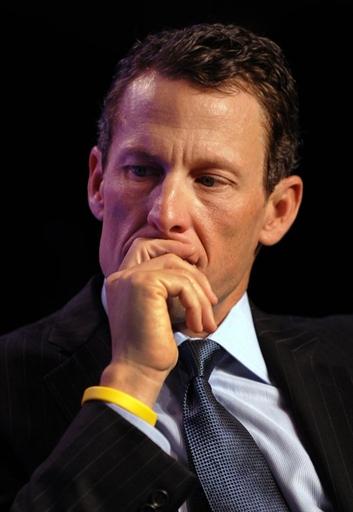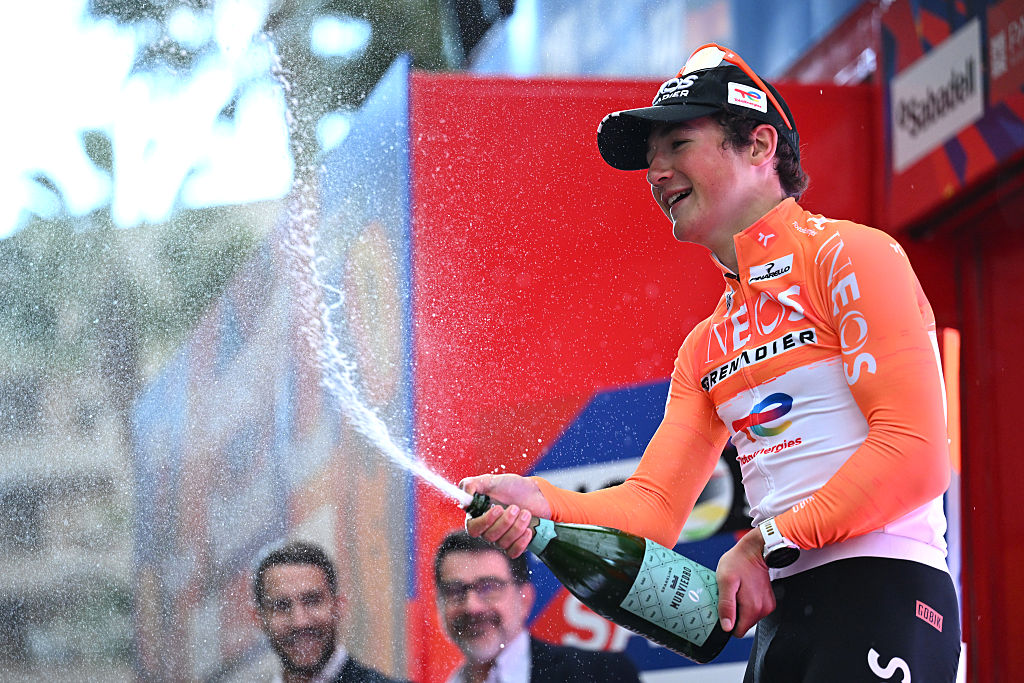Lance Armstrong’s new nemesis: Federal agent Jeff Novitzky?
With speculation rife that federal agent Jeff Novitzky’s doping investigation will soon bring him to Europe, Cyclingnews profiles the man behind a formidable reputation.
The latest race content, interviews, features, reviews and expert buying guides, direct to your inbox!
You are now subscribed
Your newsletter sign-up was successful

At twenty past midday on September 3rd 2003, federal agent Jeff Novitzky’s 6’6” silhouette loomed in the doorway of the Bay Area Co-operative Laboratory (BALCO) on the San Francisco peninsula, and with it the shape of a new, altogether more than daunting threat doping athletes had ever faced before.
Since the start of his investigation the previous August, Novitzky had been sleuthing in silence. For nearly a year, the then 35-year-old father of three had regularly rummaged through trash cans in the BALCO car park, a mile from his family home, finding syringes and correspondence clearly linking the lab to an international ring.
He and his cohorts had seen world class sprinters like Dwain Chambers arrive and leave. He had been tailing the lab’s owner, a madcap scientist and self-publicist by the name of Victor Conte for several months. Now, with Conte’s latest protégé Kelli White reeling from her positive test for the stimulant modafinil at the recent World Athletics Championships in Paris, and the United States Anti-Doping Agency (USADA) about to finger four more Conte clients, Novitzky made his move.
Flanked by the two dozen agents to whom he’d handed briefing documents an hour or two earlier, Novitzky announced his arrival with the following words: “Federal agents. We have a search warrant.”
Within months, Novitzky, a former high jump prodigy and college basketball player, had inadvertently earned the place in sporting history that his fragile body never permitted in his own athletic career. Among his other achievements, and even disregarding his “victims” in baseball, he had effectively ended the careers of what were then the fastest male and female on the planet: Marion Jones and Tim Montgomery.
In the next few weeks, good authority has it, Novitzky will travel to Europe to pursue his and perhaps professional sport’s most significant doping probe since BALCO. Perhaps, though, is the operative word, for the federal agent refused to confirm all talk of his European séjour when contacted by Cyclingnews in late October.
While Lance Armstrong, his former team and doping are widely assumed to constitute the three dimensions of Novitzky’s latest Rubik’s Cube, the investigation’s precise scope also remains unclear, not least because doping in sport is a matter usually deemed unworthy of federal attention.
The latest race content, interviews, features, reviews and expert buying guides, direct to your inbox!
Eight years on, indeed, exactly why Novitzky or indeed the US government ever became involved in BALCO is still to be ascertained.
After graduating from San Jose State with an accounting degree in 1992, Novitzky had scored a job working for the Internal Revenue Service Criminal Investigation, where he was quick to distinguish himself as a tenacious and highly-skilled undercover operative, often targeting drug dealers.
That he proved an instant hit at the IRS wouldn’t have surprised those who had known him in his school days at Mills High in Millbrae, or at San Jose State. “He was so self-directed, so responsible. He always dressed like – and I use this term in the best meaning – like a boy scout. He was clean-cut, buttoned-down collar, nothing wild in terms of appearance. He was a really mature guy and he knew where he was going in life,” his basketball coach at San Jose, Stan Morrison, told Mark Fainreau-Wada and Lance Williams, authors of Game of Shadows, the superb account of the BALCO scandal.
There was very little in Novitzky’s personal or professional life, however, which hinted at a smoldering desire to expose drug cheats. Nonetheless, one of the federal agents who worked on BALCO, Iran White, later told Playboy magazine that Novitzky himself had instigated the probe, having watched baseball star and Conte acolyte Barry Bonds morph into a muscle-bound world-beater.
On this issue, too, Novitzky has remained resolutely tight-lipped, stating merely the government had ordered the probe on the basis of information from an unspecified source that world class athletes were acquiring performance enhancing drugs from BALCO, which just happened to be around the corner from where he lived.
White also claimed that Novitzky had been “obsessed with Bonds” and talked about securing a book deal to chronicle his detective work. This, Novitzky staunchly denied.
Even early in the investigation, though, one thing was abundantly clear: Novitzky was almost as passionate about his sport as he was about his job. He even coached girl’s junior sports and indulged his fascination with American football in a fantasy league with his friends. What he desperately lacked in the early stages of the BALCO investigation was the knowledge about doping which even back then most cycling fans, at least, would have considered elementary.
With exquisite irony, eight years apart, Novitzky and Armstrong would turn to the same anti-doping expert, Dr. Don Catlin, to validate their two, very different causes. While late in 2009, amid considerable fanfare, Armstrong announced that Catlin would perform additional tests on his blood and urine throughout his comeback season – only to see the plan fail – in October 2002, Novitzky had asked Catlin to help identify evidence plundered from Victor Conte’s garbage. “He started reading things to me – E-rit-ro-potin. He couldn’t pronounce it.” Catlin recalled in Game of Shadows.
If it’s fair to assume that Novitzky is now considerably more au fait with all things pharmaceutical, it’s also true that the BALCO investigation established him as a new poster-boy for the anti-doping movement. Catlin called him “my hero”, although the scientist has since voiced his concerns about the US government’s increasingly active role in anti-doping - and more precisely its motives. “Lots of people don’t like Lance Armstrong. They are convinced that he did dope and they want to expose it,” Catlin told Outside magazine recently.
Justified or not, Novtizky’s efforts have drawn effusive praise from more than just Catlin. “There is no greater friend of clean athletes,” Travis Tygart, the chief executive officer of the United States Anti-Doping Agency, said of Novitzky in 2007. “Clean sport should be real thankful that he is on our team. He deserves a shrine in Cooperstown and an M.V.P. award of clean sport. He has done more than any other individual to bring issues to the forefront.”
Kevin V. Ryan, the former United States attorney in San Francisco who worked on the BALCO cases investigated by Novitzky, once said simply: “[Novitzky] has changed the face of sports”.
“He is very dogged, very determined, very focused,” Ryan told Outside this year. “If I were a professional athlete, I would not relish the fact that this guy might be on my tail.”
Perhaps unsurprisingly in light of Ryan’s comments, Novitzky has collected almost as many detractors as admirers, particularly among those with first-hand experience of his calm but clinical modus operandi.
He may not have sought notoriety, but the high-profile nature of the BALCO enquiry and now his alleged pursuit of Armstrong has made an already-imposing figure even more conspicuous. In 2007, in declining an interview with the New York Times, he also requested that they refrain from illustrating their story with his photograph. “The possibility of greatly diminishing my ability to investigate this case and others arises any time my picture and name are publicized,” Novitzky wrote in an e-mail.
His critics would and have already argued that Novtizky needs no one’s help to sabotage his own investigations. Despite having confessed to and even bragged about doping athletes, BALCO mastermind Victor Conte, in particular, has repeatedly attacked him, even going as far as to claim the agent’s mistakes had led to the government dropping 40 of the 42 charges against him. “He lies and cheats” Conte told Outside, citing fabricated statements he claims Novitzky made in court affidavits. “So we have a liar and a cheat going after a group of liars and cheaters. Do the athletes cheat? Yes. The government cheats to win, too.”
Another outburst, though, undoubtedly tells us more about Conte and the personal nature of his feud with Novtizky than about the investigator: “Novitzky masturbates while reading the Chronicle” the former BALCO svengali once wrote in an e-mail to the San Francisco Chronicle.
Other broadsides, admittedly still from those on the receiving end of Novitzky’s delving, maybe merit more attention. “Novitzky is to law enforcement the very thing he accuses Lance Armstrong of being in bicycling. He pushes the envelope as far as it can be pushed,” said Paula Cranny, attorney to Barry Bonds’s former weight trainer Greg Anderson, no doubt referring to the kind of rule-bending that landed Novitzky in trouble for violating the Fourth Amendment.
Granted a search warrant to access the dope-test results of ten BALCO-linked baseball players tabulated in a spreadsheet in 2004, Novitzky took the liberty of scrolling across the page to a longer list of pitchers and hitters who had failed the urine controls mandated as part of Major League Baseball’s then nascent anti-doping program. He came away with 104 names, some of which later found their way into the media, but was later told by the United States Court of Appeals for the Ninth Circuit that his actions had been “unlawful”.
One witness who has been questioned by Novitzky about Armstrong in recent months argues that this incident shouldn’t, but no doubt will be, seized upon by the agent’s opponents. “Look, that whole thing with the Fourth Amendment and what you can and can’t do was very murky,” the source tells Cyclingnews. “Based on the contact I’ve had with him, is he very passionate? Yes. Is he aloof? Absolutely. Aggressive? Definitely. But unethical? No way…”
Like others in the past, this witness says that negative appraisals of Novitzky emanate almost solely from those in his line of fire.
“From the very start with me, he made it very clear that it was going to be a one-way street. I’d give him the information he wanted and get nothing in return. He wouldn’t tell me about the investigation. He wouldn’t ask me about the family. He knows that if he even laughs at a joke, it could be ammunition for the Armstrong camp to suggest that he’s got some kind of ulterior motive or lacks credibility.
“As for the notion that he was lining up a book deal during BALCO, I think that’s total bullshit,” the source continues. “He has no desire to make a name for himself. He’s not ego-driven. If he tells a witness that they face perjury charges if they lie, that’s not a threat or intimidation – it’s a fact.”
Facts have been a rare commodity since news of the investigation broke in May, and that looks set to continue over the coming months, as Novitzky keeps up his mysterious crusade in silence and as much anonymity as his growing aura will allow. While in BALCO, he found his treasure trove in a parking lot a few hundred metres from his front door, logic suggests that the “dumpster-diving” nemesis of Marion Jones, Tim Montgomery and now, maybe, Lance Armstrong, will have to venture further a field in his latest quest.
Whether that means an imminent visit Europe, only Novitzky, a handful of his closest family and associates, plus those on his hit-list of interviewees, will probably know. One thing, though, has been true from the start of this investigation and remains true today: in the words of attorney Richard Emery, who came up against Novitzky during BALCO, “He is a nightmare for anyone that's he's focused on."
